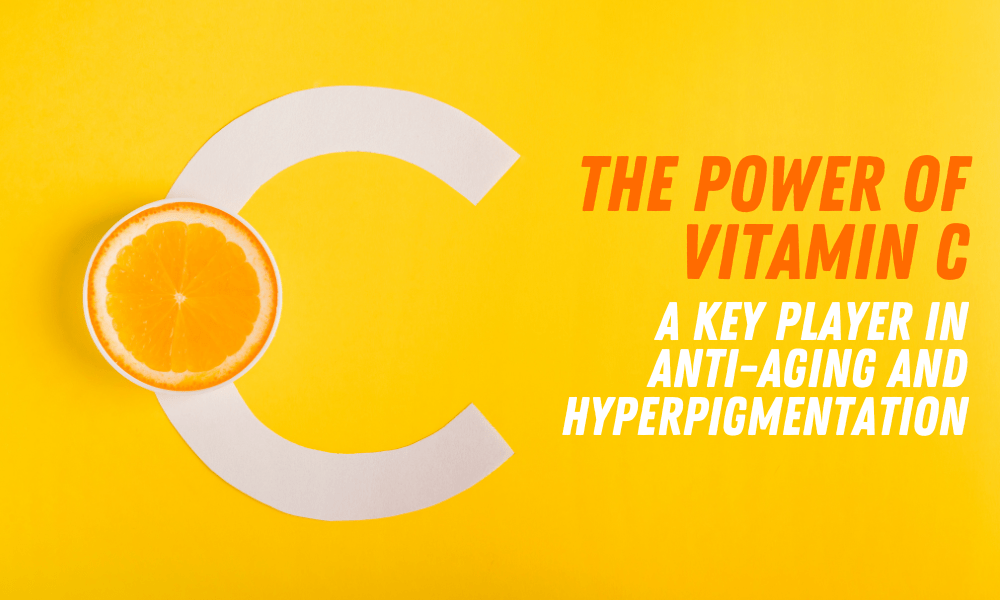When it comes to skincare, few ingredients are as renowned and versatile as Vitamin C. This powerhouse antioxidant not only boosts overall skin health but also plays a significant role in combating aging signs and managing hyperpigmentation. In this blog, we will explore the remarkable benefits of Vitamin C and its impact on anti-aging and hyperpigmentation concerns.
Anti-Aging Benefits of Vitamin C

Collagen Production
Vitamin C is essential for collagen synthesis, a protein that provides structure, firmness, and elasticity to the skin. By stimulating collagen production, Vitamin C helps reduce the appearance of fine lines and wrinkles, resulting in a more youthful complexion.
Antioxidant Protection
Vitamin C combats free radicals, which are unstable molecules that damage collagen and accelerate the aging process. Its antioxidant properties help neutralize free radicals, protecting the skin from oxidative stress and environmental aggressors.


Brightening and Even Skin Tone
Vitamin C can help fade age spots, sunspots, and post-inflammatory hyperpigmentation, promoting a more even complexion and restoring radiance to the skin.
Managing Hyperpigmentation with Vitamin C

Inhibits Melanin Production
Vitamin C inhibits the enzyme responsible for melanin synthesis, the pigment that gives color to our skin. By slowing down melanin production, it can help reduce the appearance of dark spots and hyperpigmentation.
Brightens the Skin
Vitamin C’s ability to inhibit melanin production leads to a brighter complexion. Regular use of Vitamin C serums or creams can help diminish the intensity of hyperpigmentation and promote a more even skin tone.


Protects Against UV Damage
Vitamin C provides some protection against UV rays, although it should not replace sunscreen. When used in conjunction with sun protection, Vitamin C can help minimize sun damage and prevent the formation of new hyperpigmentation.
Choosing and Using Vitamin C Products
Stability and Formulation
Look for Vitamin C products with stable and bioavailable forms of the ingredient, such as L-ascorbic acid, as it is most effective in skincare. Ensure the product is packaged in opaque, airtight containers to protect it from light and air, which can degrade its potency.


Consistency and Concentration
Consistent use is key for optimal results. Incorporate Vitamin C into your daily skincare routine, applying it in the morning after cleansing and toning. Aim for a concentration of 10-20% for effective results without causing irritation.
Pairing with Complementary Ingredients
Vitamin C can work synergistically with other skincare ingredients. Consider using Vitamin C alongside ingredients like hyaluronic acid for hydration, niacinamide for brightening, and sunscreen for UV protection.

Conclusion
Vitamin C is an exceptional ingredient with a multitude of benefits for the skin, particularly in the areas of anti-aging and hyperpigmentation. Its ability to boost collagen production, protect against free radicals, and manage melanin production makes it a valuable addition to any skincare routine. By incorporating Vitamin C into your daily regimen and practicing consistent use, you can harness its powerful properties to promote a youthful, radiant complexion while effectively managing hyperpigmentation concerns. Embrace the transformative effects of Vitamin C and enjoy the journey to healthier, more luminous skin.






